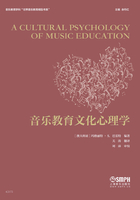
参考文献
Allsup, R. E. (2002). Crossing over: mutual learning and democratic action in instrumental music education. Unpublished doctoral dissertation, Teachers College, Columbia University, New York.
Appadurai, A. (1996). Modernity at large: cultural dimensions of globalization. Minneapolis, MN: University of Minnesota Press.
Barrett, M. S. (2003). Meme engineers: children as producers of musical culture. International Journal of Early Years Education, 11(3), 195–212.
Barrett, M. S. (2006). Inventing songs, inventing worlds: the ‘genesis’ of creative thought and activity in young children’s lives. International Journal of Early Years Education,14(3), 201–20.
Barrett, M. S. (2009). Sounding lives in and through music: a narrative inquiry of the ‘everyday’ musical engagement of a young child. Journal of Early Childhood Research, 7(2), 115–34.
Bronfenbrenner, U. (1979). The ecology of human development: experiments by nature and design. Cambridge, MA: Harvard University Press.
Bronfenbrenner, U., & Morris, P. A. (1998). The ecology of developmental processes. In W. Damon & R. M. Lerner (Eds.), Handbook of child psychology (Vol. 1, pp. 993–1028). New York: Wiley.
Bruner, J. (1990). Acts of meaning. Cambridge, MA: Harvard University Press.
Bruner, J. (1996). The culture of education. Cambridge, MA: Harvard University Press.
Chaiklin, S. (2001). Cultural–historical psychology as a multinational practice. In S.Chaiklin (Ed.), The theory and practice of cultural–historical psychology (pp. 15–34). Aarhus, Denmark: Aarhus University Press.
Chiu, C.-Y., & Hong, Y.-Y. (2006). Social psychology of culture. New York: Psychology Press.
Cole, M. (1996). Cultural psychology: the once and future discipline. Cambridge, MA:The Bellknapp Press of Harvard University Press.
Dissanayake, E. (2007). In the beginning: pleistocene and infant aesthetics and 21st century education in the arts. In L. Bresler (Ed.), International handbook of research in arts education (pp. 783–95). Dordrecht: Springer.
Engeström, Y. (2001). Expansive learning at work: toward an activity theoretical reconceptualisation. Journal of Education and Work, 14(1), 133–56.
Fiske, A. P., Kitayama, S., Markus, H. R., & Nisbett, R. E. (1998). The cultural matrix of social psychology. In D. T. Gilbert, S. T. Fiske & G. Lindzey (Eds.), Handbook of social psychology (4th edn, pp. 915–81). New York: McGraw-Hill.
Green, L. (2001). How popular musicians learn: a way ahead for music education. Aldershot, UK: Ashgate.
Green, L. (2008). Music, informal learning and the school: a new classroom pedagogy. Aldershot, UK: Ashgate.
Herskovits, M. (1949). Man and his works. Evanston, IL: Northwestern University Press.
Kitayama, S., & Cohen, D. (Eds.). (2007). Handbook of cultural psychology. New York:Guilford Press.
Lave, J., & Wenger, E. (1991). Situated learning: legitimate peripheral participation. Cambridge: Cambridge University Press.
MacPherson, S. (1910). Music and its appreciation, or the foundations of true listening. London: Joseph Williams.
Markus, H. R., & Hamedani, M. G. (2007). Sociocultural psychology: the dynamic interdependence among self systems and social systems. In S. Kitayama & D. Cohen (Eds.), Handbook of cultural psychology (pp. 3–39). New York: Guilford Press.
Marsh, K. (2008). The musical playground: global tradition and change in children’s songs and games. Oxford: Oxford University Press.
Rogoff, B. (2003). The cultural nature of human development. New York: Oxford University Press.
Schweder, R. A. (1990). Cultural psychology—what is it? In J. W. Stigler, R. A. Shweder &G. Herdt (Eds.), Cultural psychology. Essays on comparative human development (pp. 1–42). Cambridge: Cambridge University Press.
Schweder, R. A. (1991). Cultural psychology: thinking through cultures. Cambridge, MA:Harvard University Press.
Schweder, R. A., Goodnow, J., Hatano, G., LeVine, R., Markus, H., & Miller, P. J. (1998). The cultural psychology of development: one mind, many mentalities. In W. Damon (Ed.), Handbook of child psychology, Vol. 1, Theoretical models of human development (5th edn, pp. 865–937). New York: Wiley.
Valsiner, J., & Rosa, A. (Eds.) (2007). The Cambridge handbook of sociocultural psychology. New York: Cambridge University Press.
Vico, G. (1725/1948). The new science (T. G. Bergin & M. H. Fish, Trans.). Ithaca, NY:Cornell University Press.
Vygotsky, L. S. (1978). Mind in society: the development of higher psychological processes (Eds. M. Cole, V. John-Steiner, S. Scribner & E. Souberman). Cambridge, MA: Harvard University Press.
Vygotsky, L. S. (1986). Thought and language (new rev. trans. by A. Kozulin). Cambridge, MA: MIT Press.
Wenger, E. (1998). Communities of practice: learning, meaning and identity. New York:Cambridge University Press.
Woods, P., Bruner, J., & Ross, G. (1976). The role of tutoring in problem-solving. Journal of Child Psychology and Psychiatry, 17, 89–100.
Young, S. (2008). Lullaby light shows: everyday musical experience among under-two-year-olds. International Journal of Music Education, 26(1), 33–46.